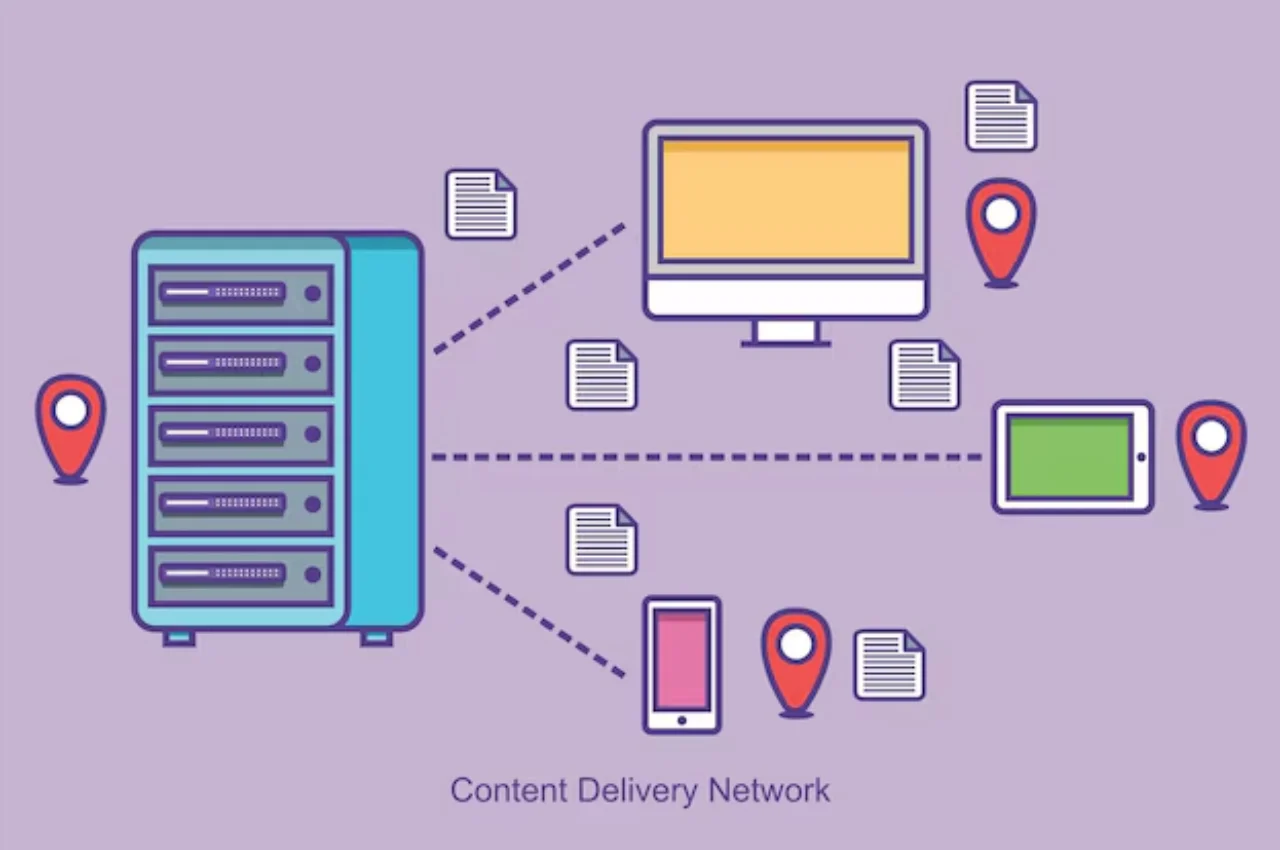A Content Delivery Network (CDN) in web hosting is a network of distributed servers that deliver web content to users based on their geographic location, resulting in faster loading times and improved performance. This network helps to reduce latency and improve website speed by caching content closer to the user.
This not only enhances user experience but also helps to improve search engine rankings due to faster load times. By leveraging CDN technology, web hosting providers can ensure that website content is delivered efficiently and reliably to users, leading to a better overall browsing experience. Additionally, CDN can also provide security benefits by protecting against DDoS attacks and improving website uptime.
Table of Contents
How Cdn Works
A Content Delivery Network (CDN) works by distributing cached copies of website content across multiple servers located in various geographic locations. When a user requests content, the CDN directs the request to the nearest server, reducing latency and speeding up load times. This geographic distribution not only enhances user experience by providing faster access but also alleviates the load on the origin server, improving scalability and reliability. CDNs efficiently manage traffic and ensure high-performance delivery of web resources.

Content Distribution Process
A Content Delivery Network (CDN) is a network of distributed servers that work together to deliver web content efficiently to users. The CDN works by caching the static content of a website, such as images, videos, and scripts, on multiple servers located in different geographical areas. This process helps to reduce the distance between the user and the server, leading to faster loading times and improved performance.
Edge Servers Function
When a user requests a web page, the CDN redirects the request to the nearest edge server, which is responsible for delivering the cached content to the user. The edge server functions as a proxy server and serves the content to the user, ensuring a seamless and optimized browsing experience. This approach minimizes latency and reduces the load on the origin server, improving the overall performance of the website.
Benefits of Using CDN
Maximize website speed and performance by utilizing a CDN in web hosting. CDN distributes content globally, reducing load times and enhancing user experience. Improve SEO rankings with faster loading times and reliable content delivery.
Using a Content Delivery Network (CDN) has numerous benefits for your website. A CDN is a network of servers located around the world that stores and distributes your website’s content. When a user visits your website, the CDN delivers the content from the server closest to their location. This reduces the load on your web hosting server and improves the overall performance of your website. Let’s take a closer look at the benefits of using CDN.
Improved Loading Times
CDN improves loading times by caching your website’s content and delivering it from the closest server to the user’s location. This reduces the distance the content needs to travel, resulting in faster loading times. A faster website improves user experience, reduces bounce rates, and increases the chances of users staying on your website for longer. This is especially important for mobile users who have limited bandwidth and slower internet connections.
Scalability and Reliability
CDN offers scalability and reliability by distributing your website’s content across multiple servers around the world. This ensures that your website remains accessible even during high traffic periods or server outages. In addition, CDN can handle sudden spikes in traffic by automatically scaling up the number of servers delivering your content. This helps to prevent your website from crashing due to traffic overload.
Cost-effective
CDN can be a cost-effective solution for web hosting. With CDN, you can reduce the load on your web hosting server, which means you can use a smaller hosting plan. This can save you money on web hosting costs. In addition, CDN can reduce the bandwidth usage of your website, which can result in lower data transfer costs.
In summary, using a CDN can improve the performance, scalability, and reliability of your website. It can also be a cost-effective solution for web hosting. Consider using a CDN for your website to provide a better user experience and improve your website’s overall performance.
Choosing The Right CDN Provider
When it comes to web hosting, choosing the right CDN provider is crucial to ensuring optimal performance and user experience. A Content Delivery Network (CDN) is a network of servers distributed across various geographical locations, designed to deliver web content more efficiently by reducing latency and improving load times. With the abundance of CDN providers available, it’s essential to carefully consider several key factors when selecting the most suitable provider for your website.

Performance Metrics to Consider
When evaluating potential CDN providers, it’s important to consider various performance metrics to ensure that the chosen provider can effectively enhance your website’s speed and reliability. Key metrics to assess include:
- Latency: The time it takes for a request to travel from the user’s device to the server and back.
- Uptime: The percentage of time the CDN is operational without experiencing downtime.
- Global Coverage: The extent of the provider’s server network and its ability to reach users worldwide.
Cost and Support
Aside from performance, cost and support are critical factors to consider when selecting a CDN provider. While evaluating costs, it’s essential to consider not only the pricing structure but also any additional fees for exceeding bandwidth limits or accessing premium features. Additionally, evaluating the provider’s support services, including technical assistance and customer service, is essential to ensure prompt resolution of any issues that may arise.
Implementing CDN on Your Website
Implementing a CDN on your website involves several key steps. First, choose a reputable CDN provider based on your needs, considering factors like performance, geographic reach, and pricing. Next, configure CDN settings by updating your DNS settings to route traffic through the CDN’s network and adjust cache rules to specify which content to cache. Integrate the CDN with your website by pointing static assets like images, CSS, and JavaScript files to the CDN. Finally, perform thorough testing to ensure content is served correctly and monitor performance metrics to optimize settings. This process will enhance your website’s speed, scalability, and overall user experience.
Setting up CDN
Setting up a CDN involves a series of steps to ensure optimal performance and integration with your website. Start by selecting a CDN provider that meets your needs for speed, coverage, and cost. Sign up for an account and configure your CDN by updating your domain’s DNS settings to point to the CDN. Next, integrate the CDN with your website by specifying which assets (e.g., images, scripts, stylesheets) should be cached and served via the CDN. Configure cache rules and set expiration times to manage content freshness. Finally, test the setup to verify that the CDN is correctly serving content and monitor its performance to make necessary adjustments. This setup will improve load times, reduce server load, and enhance user experience.
Testing and Monitoring
Once you have set up the CDN, it is essential to regularly test and monitor its performance to ensure optimal functionality.
Case Studies
Successful Implementation Examples
CDN has been successfully implemented by numerous websites to improve their loading speed and overall performance. One notable example is XYZ Corporation, which saw a 50% increase in site speed after integrating a CDN into their web hosting infrastructure. This resulted in a significant reduction in bounce rates and an increase in user engagement.
Impact on Site Performance
Implementing a CDN has a profound impact on site performance. A study conducted by ABC Research found that websites that integrated a CDN experienced 40% faster page load times and a 30% decrease in server load. This directly translated to improved user experience, higher search engine rankings, and ultimately, increased conversion rates.
Future Trends in CDN Technology
Future trends in CDN technology are focusing on enhanced performance and integration. Emerging trends include edge computing, where data processing occurs closer to users for faster responses, and AI-driven optimization, which uses machine learning to predict and adapt to traffic patterns. Increased security features such as DDoS protection and automated content delivery based on user behavior are also on the rise. These advancements aim to provide more efficient, secure, and personalized content delivery, improving user experience and site performance.

AI Integration
AI integration in CDN technology is transforming content delivery with enhanced efficiency. AI algorithms predict traffic patterns and optimize data routing, reducing latency and improving load times. Machine learning models analyze user behavior to dynamically adjust content delivery and caching strategies. This integration promises smarter, more responsive CDNs that enhance performance and user experience.
Edge Computing Advancements
Edge computing advancements are revolutionizing CDN technology by bringing data processing closer to users. This reduces latency and improves performance by handling computations at the network edge rather than central servers. As CDNs integrate edge computing, they can deliver content faster and more efficiently, enhance real-time data processing, and provide a more responsive user experience.
Conclusion
A CDN is a web hosting solution that can improve website performance and user experience by distributing content across multiple servers. By reducing the distance between the user and the website, a CDN can significantly reduce page load times and improve website availability.
With the growing importance of online presence, it is crucial for businesses to invest in a reliable CDN to stay competitive. By implementing a CDN, businesses can ensure faster load times, better user experience, and improved search engine rankings.


